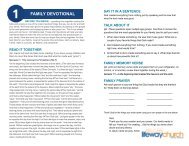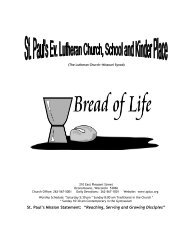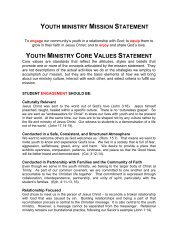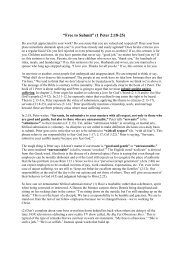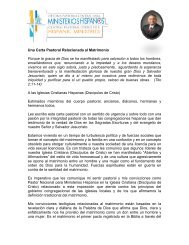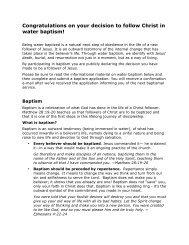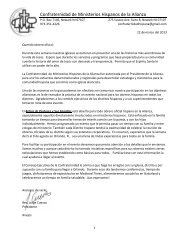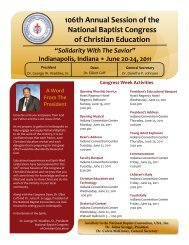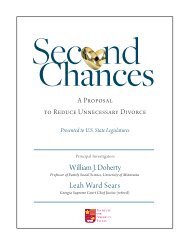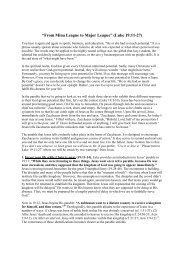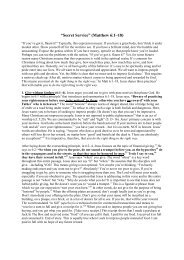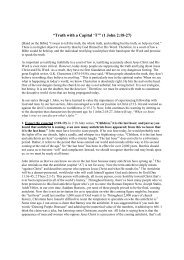“Transformed: More Than Meets the Eye” (Romans 12 - Razorplanet
“Transformed: More Than Meets the Eye” (Romans 12 - Razorplanet
“Transformed: More Than Meets the Eye” (Romans 12 - Razorplanet
You also want an ePaper? Increase the reach of your titles
YUMPU automatically turns print PDFs into web optimized ePapers that Google loves.
37 The only o<strong>the</strong>r NT use of suschematizo is found in 1 Pet 1:14. BDAG s.v. suschematizo: “to form according to a<br />
pattern or mold, form/model after something.”<br />
38 Lopez, <strong>Romans</strong> Unlocked, 242 offers this additional insight: “Believers are commanded to refrain from being<br />
molded after <strong>the</strong> cultural norms of this age. For if <strong>the</strong>y do not participate in Church, prayer, and reading <strong>the</strong> Word,<br />
Christians will automatically become victims of <strong>the</strong> world which will mold <strong>the</strong>m. Hence Paul used <strong>the</strong> passive tense<br />
of <strong>the</strong> verb conformed (syschematizes<strong>the</strong>), which refers to <strong>the</strong> world’s influence that will conform believers after its<br />
image. Consequently, a passive believer will be influenced to act and look like <strong>the</strong> people of this age unable to be<br />
distinguished as a child of God.”<br />
39 The word translated “world” is not kosmos but aion, which means “age.” Paul is not saying that <strong>the</strong> world is evil,<br />
which would contradict Genesis 1. Barnett suggests that Paul deliberately uses <strong>the</strong> term aion to refer to “<strong>the</strong> period<br />
of time that began with <strong>the</strong> ‘fall’ of Adam and ended with <strong>the</strong> ‘revelation of <strong>the</strong> sons of God’ (8:19). Paul Barnett,<br />
<strong>Romans</strong>: The Revelation of God’s Righteousness (Scotland, UK: Christian Focus, 2003), 271.<br />
40 See Titus 3:5 “He saved us, not on <strong>the</strong> basis of deeds which we have done in righteousness, but according to His<br />
mercy, by <strong>the</strong> washing of regeneration and renewing by <strong>the</strong> Holy Spirit.”<br />
41 Moo, The Epistle to <strong>the</strong> <strong>Romans</strong>, 757 remarks, “This re-programming of <strong>the</strong> mind does not take place overnight<br />
but is a lifelong process by which our way of thinking is to resemble more and more <strong>the</strong> way God wants us to think.”<br />
42 Steve Elkins, The Roman Road Revisited (Dallas: Allie Grace Books, 2005), 148.<br />
43 Tony Evans, Free at Last (Chicago: Moody, 2001), 45.<br />
44 The Greek construction eis to (“so that”) could be ei<strong>the</strong>r purpose or result. Moo, The Epistle to <strong>the</strong> <strong>Romans</strong>, 757<br />
opts for <strong>the</strong> former while Schreiner, <strong>Romans</strong>, prefers <strong>the</strong> latter. I concur with Moo and understand this as a purpose<br />
clause.<br />
45 In most instances, when <strong>the</strong> term “acceptable” is used in <strong>the</strong> NT, it refers to that which is acceptable to God (see 2<br />
Cor 5:9; Eph 5:18; Phil 4:18; Col 3:20; Heb 13:21).<br />
46 The word teleios (“perfect”) in this context means unstoppable, complete. No one can interfere with it.<br />
47 Elsewhere Paul uses dokimazo (“to prove”) to say that believers must test or examine what <strong>the</strong> Lord’s will is (Eph<br />
5:10).<br />
48 In a ministry setting this is a very important principle to keep in mind. We can’t expect casual Christians who are<br />
constantly living disobedient, fleshly lives to able to discern what God’s good, acceptable, and perfect will for <strong>the</strong>ir<br />
lives are. We need to remind people of <strong>the</strong> principle that God reveals His will to those who are walking according to<br />
His plan and purposes.<br />
49 Pao observes “The Reversal of <strong>Romans</strong> 1 in <strong>Romans</strong> <strong>12</strong>”:<br />
<strong>Romans</strong> 1:18–32 <strong>Romans</strong> <strong>12</strong>:1–2<br />
Worshiping created things ra<strong>the</strong>r than <strong>the</strong> Creator<br />
(1:25)<br />
Be involved in spiritual worship (<strong>12</strong>:1)<br />
Degrading our bodies (1:24) Offer our bodies to God (<strong>12</strong>:1)<br />
Sexual impurity (1:24) Offer <strong>the</strong> sacrifice that is holy (<strong>12</strong>:1)<br />
Given over to a depraved mind (1:28) The mind will now be renewed (<strong>12</strong>:2)<br />
Filled with every kind of wickedness (1:29) Called not to conform any longer to <strong>the</strong> pattern of<br />
this world. (<strong>12</strong>:1)<br />
See David W. Pao, <strong>Than</strong>ksgiving: An Investigation of a Pauline Theme (Leicester: Apollos; Downers Grove:<br />
InterVarsity: 2002), 102.<br />
50 Adapted and revised from Tony Evans, What Matters Most (Chicago: Moody, 1997), 102.



